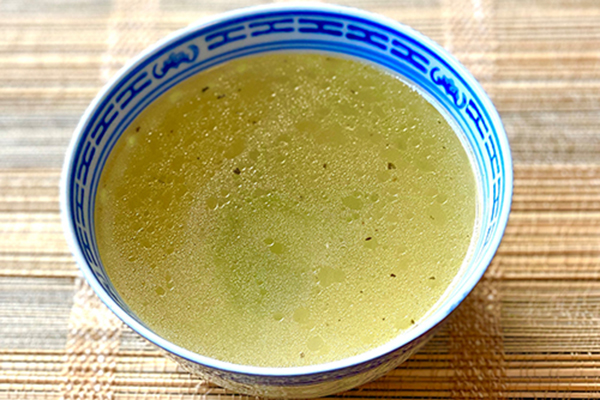
Bone broth has been around for centuries, it’s the traditional way to make soup or stew. It just seems like a new thing since many of us don’t tend to make soups or broths from scratch anymore. It has become popular due to its supposed healing properties as well.
Bone broth can be rich in many nutrients, including calcium, magnesium, potassium and protein mostly in the form of collagen. The exact nutrient content will vary depending on the bones used, cooking method, and how long it was cooked.
Collagen is the main component in connective tissue, found in our cartilage, ligaments, tendons, bone and skin. Taking collagen has been shown to be helpful for joint pain, gut health and even improving our skin!
Learn three ways to make healing bone broth. #saslife Share on XBone broth is also rich in L-glutamine which is an amino acid that has many functions in our body but is especially important for our immune system and for maintaining the integrity of our intestinal lining. Glycine is another amino acid that is rich in bone broth (it’s the main amino acid in collagen). It is an important neurotransmitter that also regulates immune function, and has anti-inflammatory properties that can be especially important for healing the intestinal track.
How to Make It
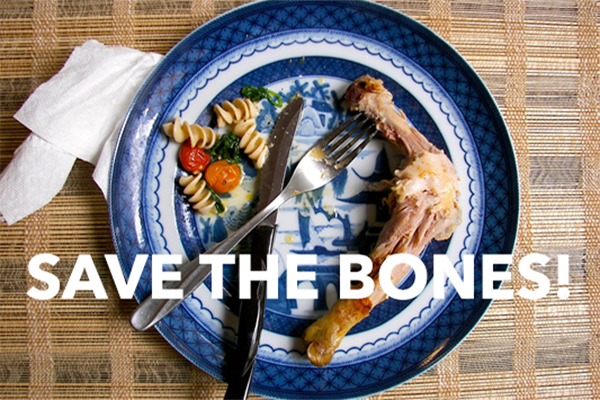
Traditionally bone broth is made by simmering bones in water for 12-24 hours. There are several ways to make bone broth and various ingredients you can add for flavor. The easiest method is to use either your slow cooker or pressure cooker. I’ve had great results with both (using my Instant Pot). You can also use a big pot on the stove, but who wants to leave a pot boiling on the stove for 12-24 hours?
Bones
The key to making good bone broth is the bones you choose. You need bones that contain cartilage to get the collagen. Chicken feet, beef knuckles, neck bones, shanks and oxtails for example.
You also want bones from healthy animals; use grass-fed beef bones or pasture-raised chicken bones. I tend to make chicken bone broth the most, mainly because we eat more chicken that has bones than beef.
I will typically use 2 chicken carcasses and one pound of chicken feet to make a batch of bone broth. I have a bag for bones in my freezer, so whenever I bake a whole chicken, or any chicken with bones, I’ll simply save the bones (with whatever skin and meat might be left) in the freezer bag until I have enough to make broth.
Acid
Next you need an acid to help leach the minerals from the bones. Most recipes will call for vinegar, but you can also use wine.
Flavor
You need some good quality sea salt for flavor. Then you can add different herbs, spices and vegetables for flavor as well. Depending on what I plan on doing with the broth, I may just make it with bones, vinegar, water and salt. Then I can add more flavor when I’m using it for a recipe. My favorite combo is garlic, ginger and peppercorns.
When collagen is simmered it forms gelatin. If you were successful with your bone broth it will have the consistency of Jell-O when cooled.
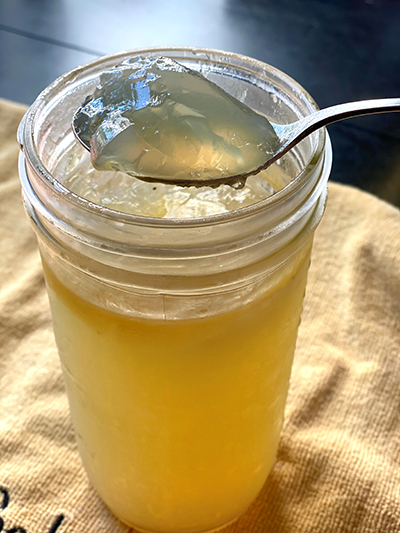
If You Prefer to Buy It
If all that sounds like too much, but you still want to try bone broth there are several good quality store-bought brands out there. Not all store-bought bone broth is the same. Look for one that uses pasture-raised or grass-fed bones and does NOT contain additives like MSG, artificial flavors, or preservatives. Look for one that notes that it was simmered at least 12 hours.
Here are two high quality brands:
Kettle and Fire – online and in several different grocery store chains
Bonafide Provisions – online and in the freezer section of several different grocery store chains
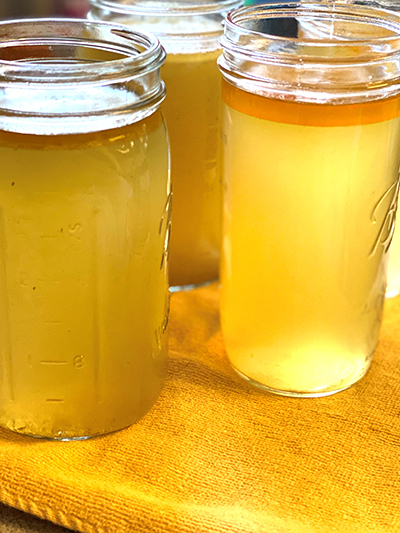
Bone Broth
Makes approx 10 cups
PRINT RECIPE
Ingredients
About 2 lbs. of bones: leftover from meals, from a whole baked chicken, etc. Make sure to include chicken feet or beef knuckles for higher collagen content.
8 cups cold water - enough to cover the bones and come to 1-inch below MAX fill line
1-2 Tbsp apple cider vinegar
2 tsp-1Tbsp sea salt
Flavor options:
1 medium onion peeled and quartered
2-3 cloves garlic peeled and sliced in half or crushed
1 tsp turmeric powder or 1 inch piece of fresh chopped turmeric
1-2 inch piece of fresh ginger root
1 Tbsp dried oregano, thyme or rosemary
1 Tbsp whole peppercorns
Directions
Pressure Cooker
- Combine all ingredients in the pressure cooker
- Fill water to about 2 inches above bones or just below the MAX line in your pressure cooker
- Set on low pressure for 120 minutes and let the pressure release naturally
Slow Cooker
- Combine all ingredients in your slow cooker
- Fill water to about 2 inches above bones or just below the MAX line
- Set on low (if that’s an option) and cook for 12 hours
Stove Top
- Combine all ingredients in large stock pot
- Fill with water to 4 inches above bones
- Bring to boil, cover, reduce heat and simmer at least 12 hours
- You can skim off any foam that accumulates on top as needed
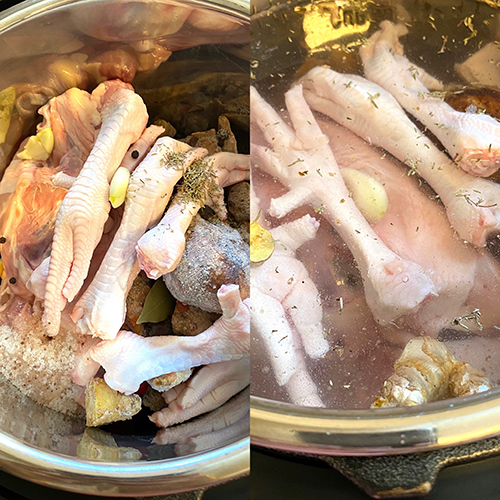
All methods
- Let the broth cool then strain into glass canning jars
- Discard the bones and vegetables
- You can easily skim the fat off the top once refrigerated to avoid an overly greasy broth
Notes
Broth may be frozen for months or kept in the refrigerator for about 5 days.
Broth can sipped as a warm drink (remember it contains protein and electrolytes), or it can be used in soups, stews, braised dishes or sauces.
You can also use it to cook grains to up their nutritional value.

2 Comments
I found a stainless steel basket/colander (I don't remember which Amazon called it) that fits inside my large crock-pot. I set it in the crock pot, pack the bones into it, and then add the water. It makes broth-making very simple, you just lift the basket of bones out.
When my mom made broth she would break the larger bones with her "meat-tenderizing hammer." I thought it was just to make them fit in the pot, but later learned that the marrow added flavor and nutrition. Or... perhaps my mom just found breaking the bones therapeutic.
🙂
Interesting about the steel basket. You will get some of the marrow goodness out just by cooking the bones for so long. I've read cautions about using bones with too much marrow, saying it make the broth taste bad. But I've never experimented with that, I wonder if smashing the bones would also alter the flavor?